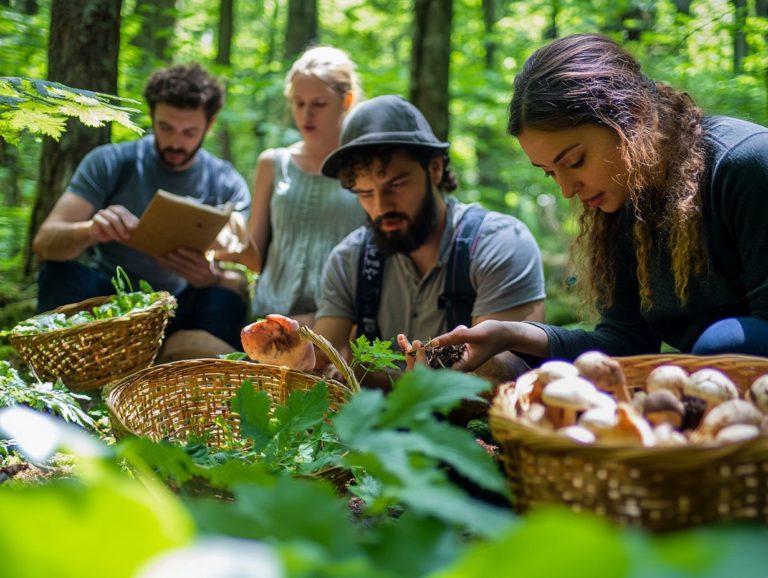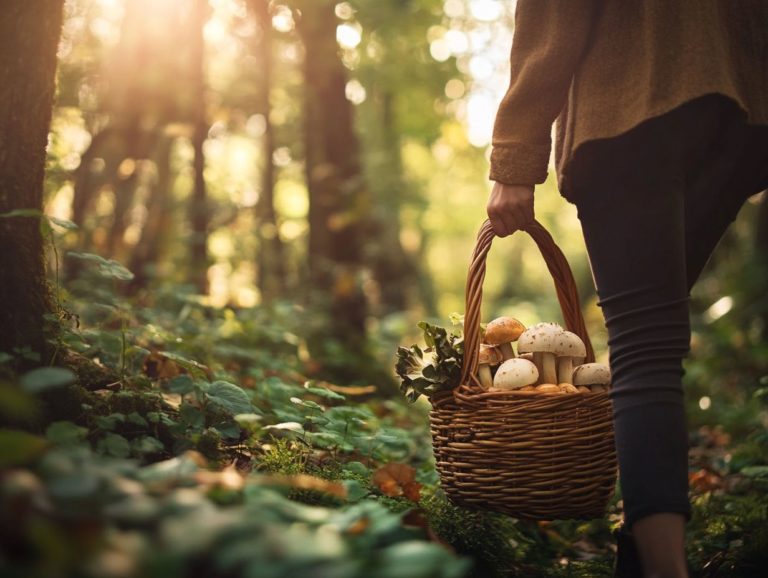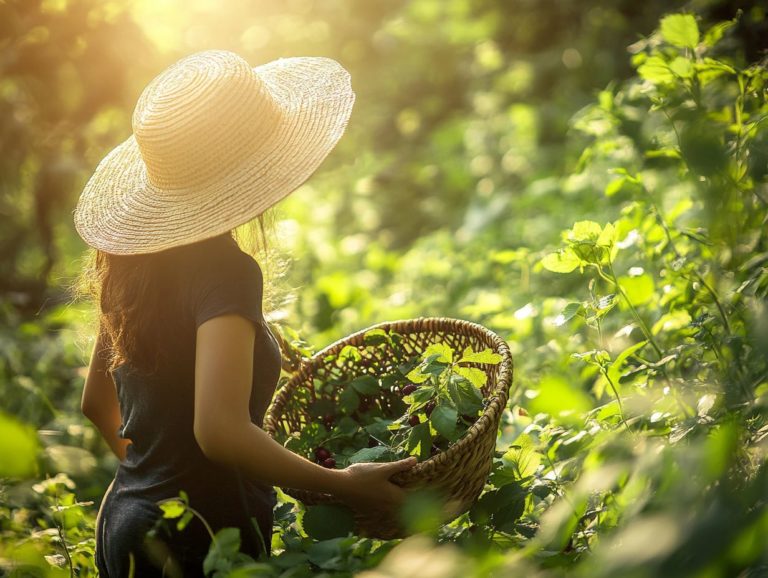How to Advocate for Sustainable Foraging Practices
Foraging presents a remarkable opportunity to deepen your connection with nature. However, it is essential to approach this practice with mindfulness and a sense of responsibility. Are you ready to discover the wild foods around you?
This article emphasizes the significance of sustainable foraging practices, which not only preserve ecosystems but also foster community engagement. By understanding the environmental impacts of your actions and supporting local farmers, you will find actionable insights tailored for those who share a passion for foraging.
Jump in and find out how you can make a real difference today!
Contents
- Key Takeaways:
- 1. Understand the Impact of Foraging on the Environment
- 2. Educate Yourself on Foraging Practices
- 3. Support Local Foragers and Farmers
- 4. Join or Start a Foraging Group
- 5. Spread Awareness and Educate Others
- 6. Follow Foraging Regulations and Guidelines
- 7. Practice Ethical Foraging
- 8. Only Take What You Need
- 9. Respect the Environment and Wildlife
- 10. Properly Dispose of Waste and Packaging
- 11. Encourage Businesses to Use Sustainable Foraging Practices
- 12. Support Conservation Efforts
- 13. Be Mindful of Invasive Species
- 14. Share Your Knowledge and Experiences
- 15. Continuously Educate Yourself and Others on Sustainable Foraging
- Frequently Asked Questions
- 1. What are sustainable foraging practices and why is it important to advocate for them?
- 2. How can I advocate for sustainable foraging practices in my community?
- 3. What are some challenges in advocating for sustainable foraging practices?
- 4. How can I ensure that I am practicing sustainable foraging?
- 5. Are there any resources available for learning about sustainable foraging practices?
- 6. How can I advocate for sustainable foraging practices on a larger scale?
Key Takeaways:
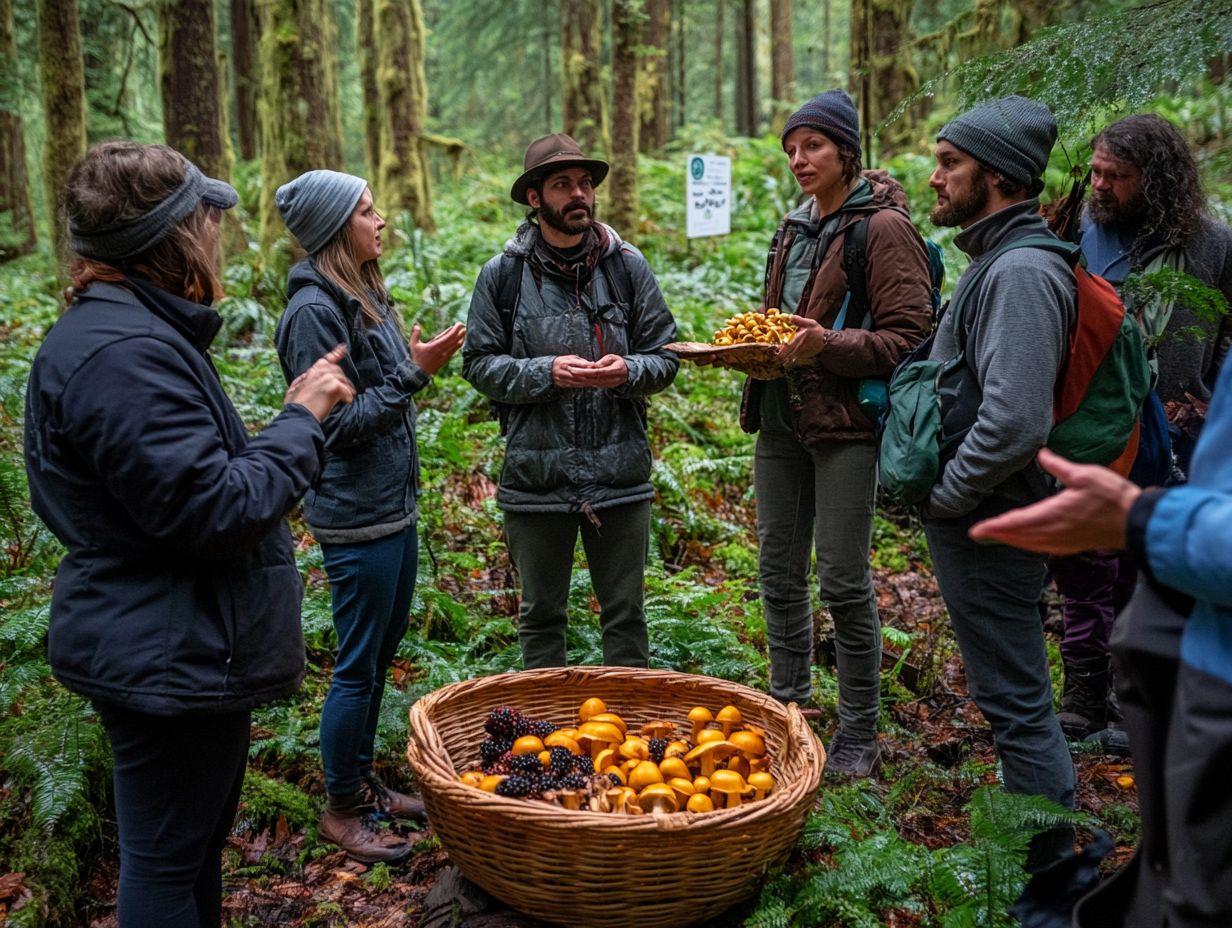
- Understand the impact of foraging on the environment and make informed decisions to minimize harm.
- Educate yourself on foraging practices and share your knowledge with others.
- Support local foragers and farmers to promote ethical and sustainable practices.
1. Understand the Impact of Foraging on the Environment
Foraging, the art of gathering wild food resources, is essential for protecting the environment and ensuring sustainability. It encourages a responsible approach to utilizing local flora. In urban settings, foraging invites you to reconnect with nature and deepens your understanding of the local ecosystem.
This bond with the environment cultivates a sense of responsibility towards local habitats. It can positively influence the variety of plants and animals around you. Consider foraging for plants like dandelion greens, wild garlic, or blackberries. Not only does this enhance your culinary repertoire, but it helps control invasive species and promote the growth of native plants.
Foragers like Alexis Nikole teach communities about the benefits of wild foods, especially in areas struggling with not having enough food. Their efforts illuminate the path where protecting the environment and nutrition intersect, enabling you to nourish yourself while also contributing to conservation.
2. Educate Yourself on Foraging Practices
Understanding foraging practices is crucial for anyone keen on harvesting wild food. It equips you with the knowledge to safely identify edible wild plants while ensuring your actions leave minimal impact on nature.
Your journey begins with research and education, which you can pursue through various resources designed for beginners. Consider diving into local workshops or online courses led by seasoned herbalists; their hands-on experience is truly invaluable.
Foraging books with detailed photographs and descriptions will become your trusted allies in recognizing plants in their natural habitats. Join local foraging groups to boost your experience; they often organize guided excursions that teach you how to forage responsibly and sustainably.
This is especially important for those living in food deserts, where access to fresh produce is scarce. Foraging can become a vital alternative for nutritious food, enabling you to take control of your food sources.
3. Support Local Foragers and Farmers
Supporting local foragers and farmers does more than just promote ethical consumption; it strengthens community ties and fosters a sustainable food system.
When you choose to buy from local foragers and farmers, you’re not only contributing to a healthier environment but also encouraging practices that are more considerate of our planet. Organizations like Forager Goods play a vital role in bridging the gap between these producers and the community, providing easier access to fresh, seasonal produce.
By prioritizing local products, you help boost the local economy while supporting sustainable agricultural methods that respect the land. Visionaries like Karl Holl inspire you to recognize the value of these connections, illustrating that even small choices can lead to impactful positive change for your community and the earth.
4. Join or Start a Foraging Group
Joining or starting a foraging group can significantly enhance your foraging skills while building community and connecting with nature, especially in urban areas.
These groups serve as invaluable platforms for sharing knowledge about local plants and their many uses. They also offer you the opportunity to engage meaningfully with Indigenous communities, respecting and honoring their traditional ecological teachings. Through collaboration with these communities, you can glean insights into sustainable practices and discover the spiritual significance of various flora, reminiscent of the wisdom imparted by historical figures like Black Elk.
As these foraging communities take shape, they weave together a richer tapestry of knowledge, merging contemporary skills with ancestral practices to promote environmental stewardship and resilience.
5. Spread Awareness and Educate Others
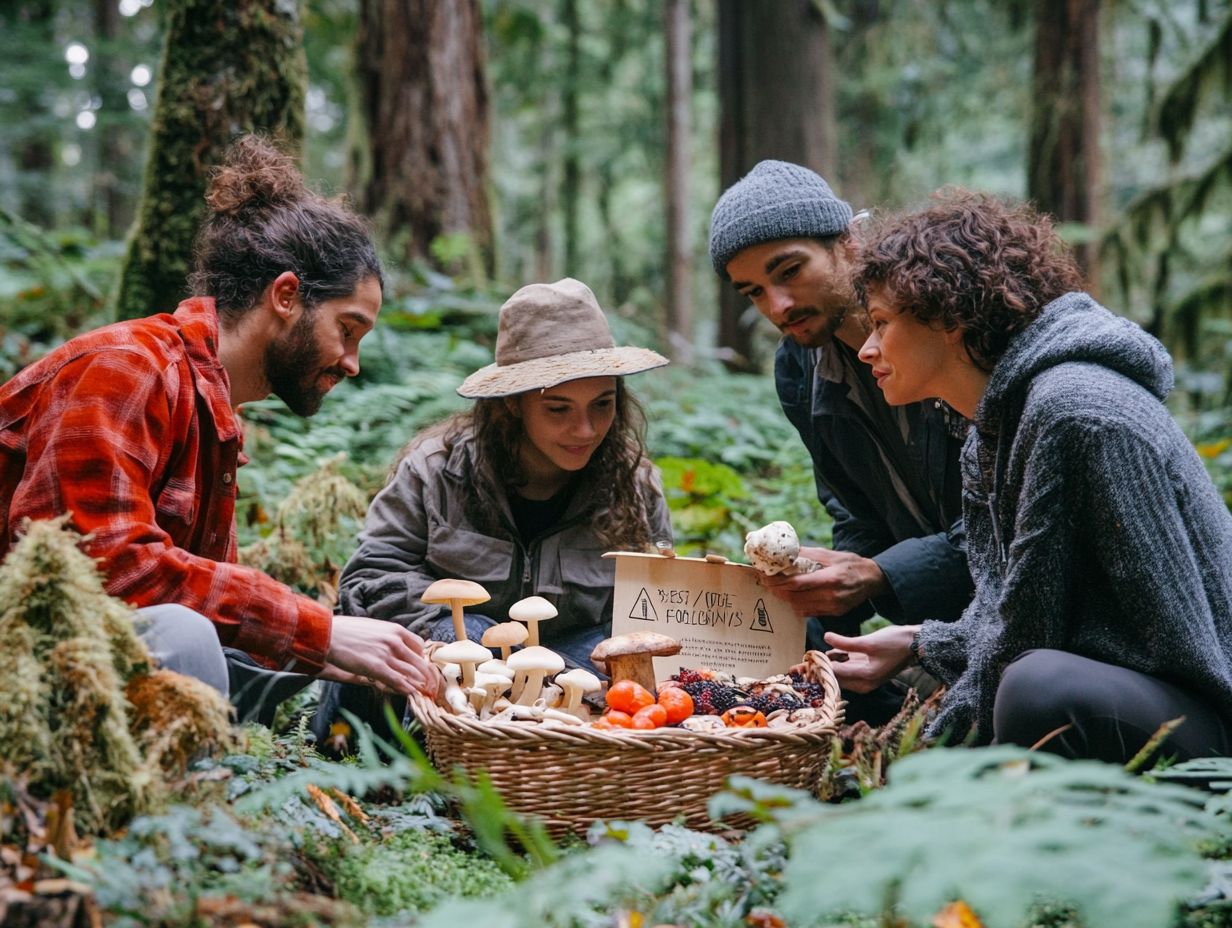
Spreading awareness about sustainable foraging practices is essential for cultivating a culture that appreciates local flora, ethical consumption, and community resilience.
By engaging communities through interactive workshops, you can offer hands-on experiences that enable individuals to connect with their local environment while acquiring practical skills. Social media campaigns are great places for sharing informative content and success stories, inspiring others to adopt these practices in their own lives.
Hosting community events not only fortifies social bonds but also underscores the importance of food sovereignty, which means having control over the food you grow and eat. It allows participants to grasp the significance of local food systems, referring to how communities grow and share food.
Collectively, these approaches can drive sustainable change, deepening the understanding of how personal actions contribute to a more sustainable and equitable food network.
6. Follow Foraging Regulations and Guidelines
Following foraging regulations and guidelines is essential for conserving natural resources and protecting the delicate balance of local ecosystems.
As a forager, stay informed about specific seasonal restrictions. Certain plants thrive only at particular times of the year, making it crucial to respect these natural cycles. There are also protected species that you should never harvest; their decline can trigger significant ecological consequences.
By adhering to these regulations, you contribute not only to your environment’s sustainability but also to the broader conservation efforts aimed at safeguarding endangered habitats.
Herbalists emphasize the importance of responsible foraging practices, sharing their expertise and advocating for the respectful use of nature s offerings. This fosters a deeper connection between communities and their ecosystems, enriching both.
7. Practice Ethical Foraging
Practicing ethical foraging allows you to harvest wild plants sustainably, supporting the delicate balance of ecosystems while addressing critical issues like food deserts and conservation efforts, as highlighted in sustainable foraging and climate action.
It s essential to only take what you need, so there s plenty left for wildlife, thereby promoting the variety of life.
By being mindful of the environment and local species, you can contribute to maintaining healthy habitats and food sources for both animals and plants.
Engaging in ethical foraging also fosters a sense of community, as you share your finds, recipes, and techniques with others. This not only strengthens local connections but also heightens awareness of sustainable practices, encouraging a collective effort to preserve natural resources for future generations.
Join a local foraging group today and start making a difference!
8. Only Take What You Need
One of the core tenets of sustainable foraging, the practice of gathering wild food in a way that supports both the environment and local communities, is to take only what you need. To enhance your understanding of this, consider learning how to respect indigenous foraging practices. This practice not only helps preserve local flora but also champions ethical consumption and tackles food insecurity.
By embracing this mindful approach, you contribute to the health of surrounding ecosystems. This ensures that vital resources remain available for future generations. For instance, when you forage responsibly for wild mushrooms or berries, you allow these plants to reproduce and flourish, creating a vibrant habitat for various wildlife. These practices promote soil regeneration and enrich the overall biodiversity of the area.
On the flip side, overharvesting can deplete specific species, throwing the delicate balance of the ecosystem into disarray and jeopardizing the survival of both plants and the animals that depend on them. Focus on sustainable harvesting to cultivate a more harmonious relationship with nature, benefiting local communities and the environment as a whole.
9. Respect the Environment and Wildlife
Respecting the environment and wildlife is essential for sustainable foraging. This respect helps keep ecosystems healthy and resilient beneficial for both you and the natural world.
As you embark on this practice, aim to minimize your impact by being mindful of where you tread. Steer clear of areas that serve as critical habitats for wildlife. Understanding the ecological roles of various plants and animals can guide you in making responsible choices.
Take only what you need and leave plants intact. This allows them to continue thriving and contributing to the ecosystem. Enhance your respect for nature by learning about local flora and fauna. This fosters a deeper appreciation for their vital role in maintaining biodiversity.
Embrace these principles now to enjoy the rewards of nature while preserving it for future generations!
10. Properly Dispose of Waste and Packaging
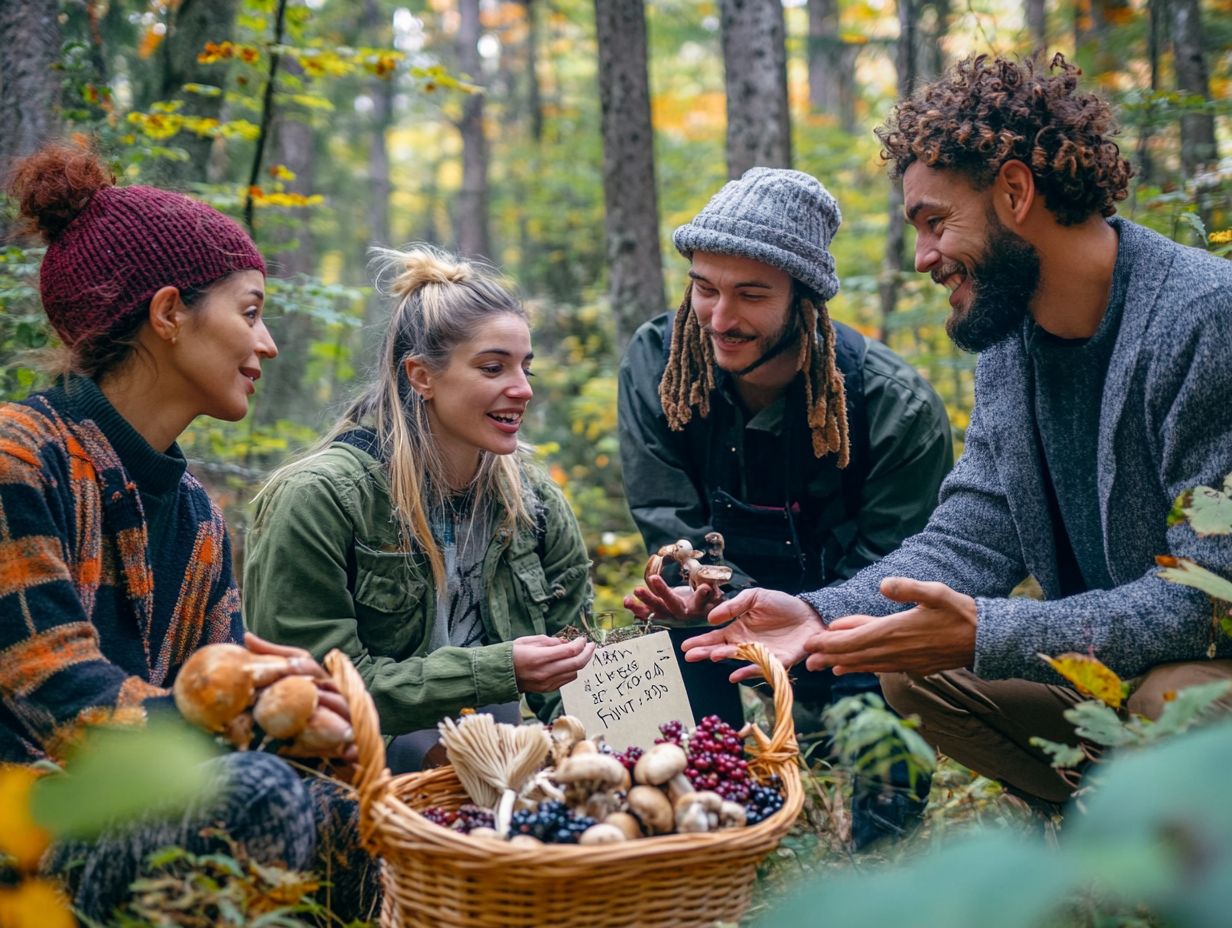
Properly disposing of waste and packaging while foraging is crucial for preserving the integrity of ecosystems and bolstering conservation efforts in local communities.
When you venture into nature to gather wild edibles, weave responsible waste management strategies into your experience. Always carry reusable bags or containers to minimize single-use plastics. Ensure that any remnants of your activities are collected and taken home.
You have the power to make a difference not just by participating in community clean-ups, but by inspiring others through your actions. Share insights about the importance of leaving no trace to foster a sense of collective responsibility. Cultivate a culture that values and protects the environment for generations to come.
11. Encourage Businesses to Use Sustainable Foraging Practices
Encouraging businesses to adopt sustainable foraging practices can profoundly impact local economies and foster a culture of ethical consumption and food sovereignty.
Consider companies like Wild Foods and Foraged; they have set remarkable standards by sourcing ingredients sustainably. This approach not only ensures a minimal ecological footprint but also provides fresh, locally-sourced products that resonate with conscious consumers.
By prioritizing these practices, you can enhance your brand s reputation and attract a community that truly values environmental stewardship.
When local consumers actively support such ventures, it creates a ripple effect, motivating other businesses to embrace sustainability as a fundamental principle. This community backing cultivates a robust market for ethically sourced goods, enabling businesses to thrive while positively contributing to both the ecosystem and local traditions.
12. Support Conservation Efforts
Supporting conservation efforts is crucial for the lasting health of foraging practices and the overall well-being of our ecosystems. This is especially important in areas grappling with food insecurity.
By getting involved in local initiatives, you can make a meaningful impact on preserving the variety of life in a particular habitat and advocating for the responsible use of natural resources. One effective way to bolster these efforts is by partnering with Indigenous communities, who possess invaluable knowledge of sustainable foraging techniques cultivated over generations.
Engaging in collaborative projects educates you about local flora and fauna and fosters a sense of community and shared purpose. By actively supporting these initiatives, you can help raise awareness about the significance of conservation, inspiring others to appreciate and protect the natural world around them.
13. Be Mindful of Invasive Species
Being mindful of invasive species while foraging is crucial for everyone. These plants can disrupt local flora and negatively affect ecosystems, making your role in conservation efforts even more significant.
When you prioritize recognizing and avoiding invasive species, you contribute to maintaining the delicate balance of native ecosystems. This awareness supports biodiversity and protects the local wildlife that relies on native plants for food and habitat.
By choosing to forage sustainably, you play a vital role in preserving the natural environment, helping ecosystems remain resilient against the threats posed by invasives. This not only enhances your foraging experience but also deepens your appreciation for the intricate relationships within nature. To aid in this effort, check out the top resources for sustainable foraging, reinforcing the importance of stewardship in the landscapes we all share.
Sharing your knowledge and experiences with foraging enables others to embrace sustainable practices. This nurtures community support and deepens the collective understanding of how to safely gather wild plants.
By connecting with local foraging groups or participating in workshops, you can exchange invaluable insights about local flora, seasonal harvests, and safe preparation methods. Platforms like Meetup and social media groups frequently host events where you can share your foraging stories while learning about regional ecosystems.
Seasonal festivals centered around wild edibles serve as ideal venues for gathering, swapping tips, and even enjoying a communal meal featuring your foraged finds. These experiences foster a sense of shared purpose and reinforce the importance of preserving nature s bounty for generations to come.
15. Continuously Educate Yourself and Others on Sustainable Foraging
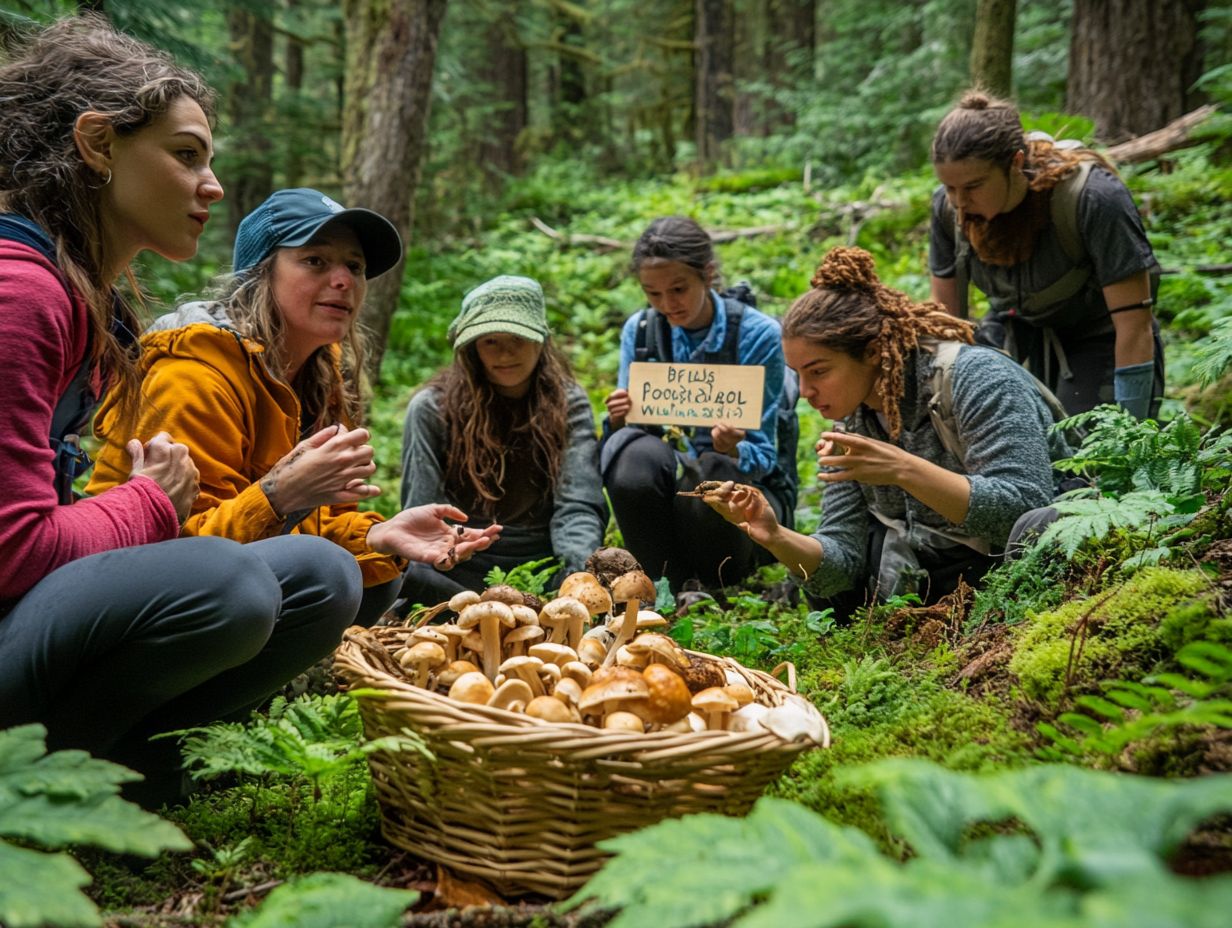
Continuously educating yourself and others about how to use local resources for sustainable foraging practices is essential for fostering a culture of ethical consumption and the right of people to healthy and culturally appropriate food within your community.
As you embark on this lifelong learning journey, you’ll deepen your understanding of local ecosystems. This enhances your ability to responsibly harvest wild edibles without compromising the environment. Books on plants and foraging are great resources, while hands-on workshops provide the experience needed to bridge theory and practice seamlessly.
By joining online communities and forums, you can share insights, seek advice, and celebrate your discoveries with fellow enthusiasts, creating a supportive network that champions sustainable practices and ongoing education in this vital skill.
Frequently Asked Questions
1. What are sustainable foraging practices and why is it important to advocate for them?
Sustainable foraging practices involve gathering and harvesting wild plants and animals in a way that does not harm the environment or deplete natural resources. By learning how to forage responsibly, you can advocate for these practices, helping to maintain the balance of ecosystems and ensuring the availability of these resources for future generations.
2. How can I advocate for sustainable foraging practices in my community?
There are several ways to advocate for sustainable foraging practices in your community. Start by educating others about sustainable foraging and their importance.
Support local farmers and foragers who follow sustainable methods. Encourage others to do the same.
Join community events or organizations that promote sustainable foraging.
3. What are some challenges in advocating for sustainable foraging practices?
Changing people’s perceptions about foraging can be a major challenge. Many view it as harmful, but with proper education, this can change.
The lack of regulations can also pose difficulties. Without enforcement of laws, it’s hard to hold individuals accountable for unsustainable practices.
4. How can I ensure that I am practicing sustainable foraging?
To practice sustainable foraging, follow some basic guidelines. Obtain any necessary permits and respect local laws and regulations.
Only harvest what you need and avoid over-harvesting. Leave the area as you found it, without trash or damage to plants.
5. Are there any resources available for learning about sustainable foraging practices?
Yes, many resources are available for learning about sustainable foraging. Attend workshops, read books, or watch online videos on the topic.
Reach out to local organizations or community experts for guidance and resources.
6. How can I advocate for sustainable foraging practices on a larger scale?
Raising awareness is key to advocating for sustainable foraging on a larger scale. Consider promoting ethical foraging in your community by joining or supporting organizations that focus on this cause.
Contact local representatives to express your concerns, and participate in public forums. Use social media to spread information and educate others.

